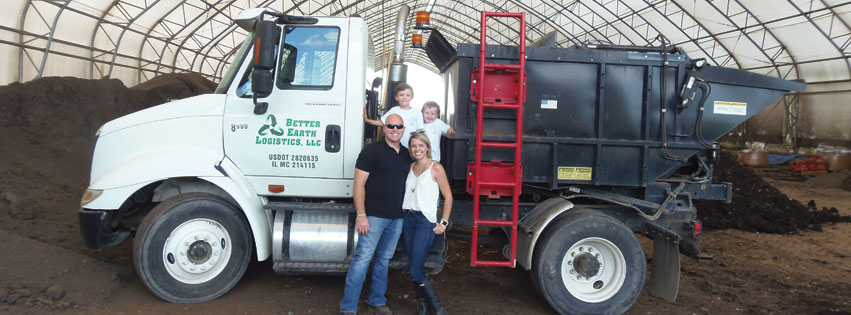
There is ample evidence that humans are overrunning the planet’s resources and causing ecological destruction to our natural environment. The good news is, we can slow this process considerably by simply reconsidering the way we consume and dispose of food. Convincing people to change their habits is an uphill battle, say Luke and Yvonne Rosenbohm, but it’s one they’ve taken on to ensure a more sustainable future for the next generation.
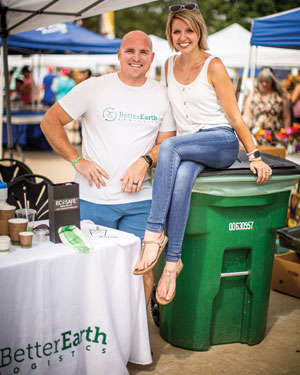
“We want to fix this problem for our kids,” Yvonne says, “before the government mandates it.” As our landfills begin to run out of space, that is a very real possibility.
About 20 percent of what goes into landfills is food waste, according to the U.S. Environmental Protection Agency—and composting is one of the best ways to reduce this waste. Enter Better Earth Logistics, which provides a conduit to local businesses and residents by collecting and hauling their food waste to be composted.
The business was born in 2015 to provide an extra service for Luke’s parents’ company, Better Earth Compost. “My dad was getting a lot of calls from people wanting their food waste picked up, and he didn’t have that service,” Luke explains. So he and Yvonne purchased a truck, and soon he was making pickups at local businesses, while she handled marketing and built their web presence. It’s proven to be a winning combination—for the Rosenbohms, for local businesses and for the planet.
A Mission Beyond Transport
In early 2018, Better Earth Logistics got a boost from the Tazewell County Green Initiatives program and Peoria County Sustainability team, who wanted to help them expand their services to more people. The primary obstacle was the cost of containers, so both counties purchased roughly 100 containers for use by local businesses. And as Better Earth’s business has picked up, it’s clear the company is much more than a transport service.
Luke and Yvonne are on a mission to educate people about how their food “imprint” impacts the environment. You’ll find them at the Peoria RiverFront Market on Saturday mornings in the warmer months, or attending meetings and special events year-round collecting organic waste, distributing compostable waste bags, and discussing ways to reduce waste.
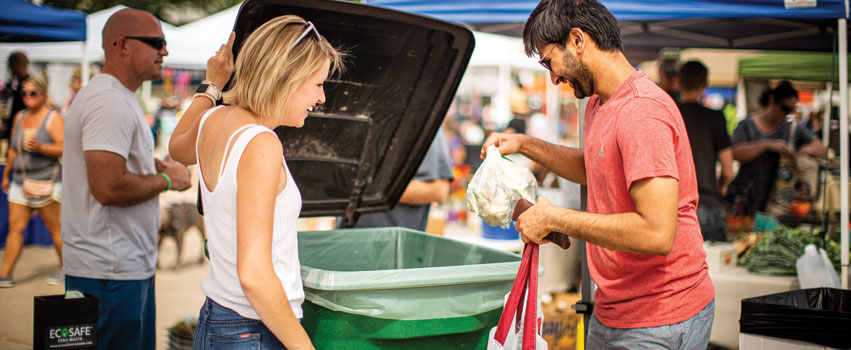
“We talk to people about how much food they buy and prepare each week, and ask, ‘How often do you really eat the leftovers?’” Yvonne explains. “Most people admit they [often] throw them out.” And it’s not just about what’s thrown away, but “how much money you’re spending and… time you’re wasting prepping extra food that you’re not eating,” she adds. They’re seeing people grasp this idea. “We give out compostable bags at the market, and people fill them up and bring them back the next week, so we’re seeing people change their habits.”
One of their clients—a restaurant with a daily lunch buffet—has dramatically altered its food production practices. “Before they worked with us, all this food was going into a big compactor—and they didn’t pay attention,” Luke says. “Now they see exactly how much is going into the containers, so they’ve adjusted what they were doing and cut their food waste by 50 percent.” Food recovery programs, he adds, are another way to help. “If you have food that can still be served… but couldn’t be sold, we need to get that food to someone who needs it.”
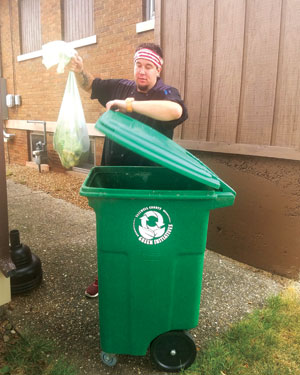
Case Studies in Success
“Before we work with a company, we like to see their facility so we can advise them of the most efficient ways to compost and keep costs down,” Luke explains. “There’s no one-size-fits-all approach.” Pekin Insurance, for instance, started its composting efforts in the kitchen, and eventually placed bins around its campus. “They recognized that people don’t just eat in the cafeteria—they take food back to their desks, so having more bins available adds convenience.” The firm has also switched to compostable dinnerware, he adds, so employees don’t have to separate their waste—another added convenience.
Better Earth Logistics, which has recently expanded its services to Bloomington/Normal, Galesburg and Pontiac, works with companies large and small, from Caterpillar Inc. and Knox College to Kemp 208 and Sugarcane Shack, among others. Jeff Madden, Kemp 208’s executive chef, had wanted to compost for a while, but it wasn’t realistic until Better Earth’s services became available. “The process of composting isn’t hard, but breaking old habits is,” he explains. “We decided to do this because it’s one of the best ways to help the environment. We have drastically cut down on the amount of landfill trash we produce.”
Sugarcane Shack has used Better Earth Logistics since May 2018, and recently started sourcing compostable cups, lids, straws and takeout ware through the company. “They are even looking into providing us compostable food prep gloves—which puts us one step closer to becoming zero waste,” explain owners Syed and Jessica Mehdi, who add that the extra cost for these materials is worth it. “If businesses want to stay viable, those few cents will not make a difference in the long run.”
Another success story took place at this year’s Tremont Turkey Festival, whose attendees consume 1,600 turkeys on average. In previous years, all that waste would go to the landfill. But this year Luke offered a solution that not only utilized the waste, but actually improved working conditions for the volunteers. “I brought containers and left the truck there so they could empty [them] throughout the festival,” he explains, which left their work areas cleaner and allowed them to operate more efficiently.
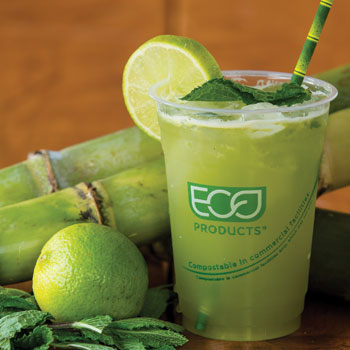
Closing the Circle
While the services provided by Better Earth Logistics are local, the benefits are global. “Think about all the water and time it takes to grow a vegetable. Suppose you only eat half of it and throw the rest in the trash. You’re not just wasting half of that vegetable, you’re wasting the water and all the resources that went into producing it,” Yvonne explains. As those resources diminish and grow costlier, a thoughtful approach to handling waste will become more and more imperative.
“All the nutrients that come from the food scraps we collect go back into the soil, so we are able to close the circle,” Luke adds, likening the process of creating compost to baking a cake. “You have to mix the right ingredients together at the right temperature in the right environment to achieve the best product, which is what we’re doing at Better Earth Compost.” The composting process takes anywhere from nine months to a year to achieve just the right consistency and complete the cycle.
The Rosenbohms want composting to be the norm, not the exception. While green and sustainability have become buzzwords in recent years, the Rosenbohms aren’t seeking to be trendsetters. They are in it for the long haul—for their community and the planet. “We want to look at every business and see how we can help reduce waste and ultimately reduce costs,” Yvonne explains. “Our dream is to walk into a store and see only a compost bin and a recycle bin. It can be done by making small, conscious changes.” PM
For more information on Better Earth Logistics’ services, or to have Yvonne and Luke speak to your organization or school about the benefits of composting, visit betterearthlogistics.com.
- Log in to post comments

